|
|
|
Sort Order |
|
|
|
Items / Page
|
|
|
|
|
|
|
| Srl | Item |
| 1 |
ID:
086942
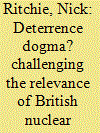

|
|
|
|
|
| Publication |
2009.
|
| Summary/Abstract |
In December 2006 the British government released a White Paper announcing its intention to begin the process of replacing its current Trident nuclear weapons system, thereby allowing it to retain nuclear weapons well into the 2050s. In March 2008 the government released its National Security Strategy that stressed the long-term complexity, diversity and interdependence of threats to British security with a clear focus on human rights, justice and freedom. This article asks how the threat to kill tens if not hundreds of thousands of people with British nuclear weapons fits into the National Security Strategy's world view and questions the relevance of an instrument of such devastating bluntness to threats defined by complexity and interdependence. It argues that the government's case for replacing the current Trident system based on the logic of nuclear deterrence is flawed. First, Britain faces no strategic nuclear threats and the long-term post-Cold War trend in relations with Russia and China-the two nuclear-armed major powers that could conceivably threaten the UK with nuclear attack-is positive, despite current tensions with Moscow over Georgia. Second, the credibility and legitimacy of threatening nuclear destruction in response to the use of WMD by 'rogue' states is highly questionable and British nuclear threats offer no 'insurance' or guarantee of protection against future 'rogue' nuclear threats. Third, nuclear weapons have no role to play in deterring acts of nuclear terrorism whether state-sponsored or not. Fourth, British nuclear threats will be useless in dealing with complex future conflicts characterized by 'hybrid' wars and diverse and interdependent sources of insecurity. The article concludes by arguing that the government's fall-back position that it must keep nuclear weapons 'just in case' because the future security environment appears so uncertain, makes no sense if British nuclear threats offer no solution to the causes and symptoms of that uncertainty.
|
|
|
|
|
|
|
|
|
|
|
|
|
|
|
|
| 2 |
ID:
161331


|
|
|
|
|
| Summary/Abstract |
The humanitarian initiative for nuclear disarmament has challenged and transformed global nuclear politics. Aimed at delegitimising nuclear weapons as acceptable instruments of statecraft, the initiative has been backed by many civil society organisations and most non-nuclear-weapon states. The nuclear-weapon states, however, have opposed the initiative, accusing it of undermining the Nuclear Non-Proliferation Treaty and destabilising nuclear politics. Conceptualising a ‘diplomacy of resistance’, this article positions the humanitarian initiative as a transnational social movement and traces its development through practices of resistance and counter-resistance. Drawing on Robert Cox’s conception of resistance as counter-hegemonic and Michael Barnett and Raymond Duvall’s taxonomy of power, the article explores the nexus of power and resistance in global nuclear politics. We explain the humanitarian movement’s specific aims and practices as a function of its champion’s relative political weakness vis-à-vis the nuclear-weapon states. The movement’s coherence and effectiveness, in turn, was fostered by a coalitional logic that allowed different identities of resistance to be steered towards a nuclear ban treaty within the UN’s institutional framework.
|
|
|
|
|
|
|
|
|
|
|
|
|
|
|
|
| 3 |
ID:
168437
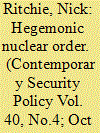

|
|
|
|
|
| Summary/Abstract |
The notion of a “global nuclear order” has entered the lexicon of nuclear politics. The 2017 Treaty on the Prohibition of Nuclear Weapons has prompted further questions about how we understand it. Yet missing from analysis of nuclear order and the “Ban Treaty” is a critical analysis of the power relations that constitute that order. This article develops a critical account of global nuclear order by applying Robert Cox's concept of hegemony and power to the global politics of nuclear weapons, drawing on the politics of the Ban Treaty. It theorizes a “nuclear control order” as a hegemonic structure of power, one that has been made much more explicit through the negotiation of the Ban Treaty. This fills a void by taking hegemony and power seriously in theorizing nuclear order, as well as explaining both the meaning of the Ban Treaty and its limits.
|
|
|
|
|
|
|
|
|
|
|
|
|
|
|
|
| 4 |
ID:
153900


|
|
|
|
|
| Summary/Abstract |
This article argues that the study of national identity is central to understanding and explaining national and transnational nuclear politics. It argues that the meanings assigned to nuclear weapons are not fixed or self-evident, but are instead changeable and contingent on social and historical context. The article develops this argument by studying how the Scottish National Party has framed UK nuclear weapons in ways very different from those of the major UK political parties. It argues that the SNP has done this by developing and promoting a specific national identity for an independent Scotland in which nuclear weapons have no place. This identity is juxtaposed against that of a “Westminster other” for whom nuclear weapons remain highly valued. The article provides an original constructivist case study of contemporary Scottish-British nuclear politics and the social construction of nuclear identities in the context of the 2014 Scottish-independence referendum and the 2015 general election.
|
|
|
|
|
|
|
|
|
|
|
|
|
|
|
|
| 5 |
ID:
074860
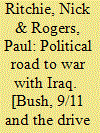

|
|
|
|
|
| Publication |
London, Routledge, 2007.
|
| Description |
xi, 228p.
|
| Series |
Contemporary Security Studies
|
| Standard Number |
0415397324
|
|
|
|
|
|
|
|
|
|
|
|
Copies: C:1/I:0,R:0,Q:0
Circulation
| Accession# | Call# | Current Location | Status | Policy | Location |
| 051894 | 327.730567/RIT 051894 | Main | On Shelf | General | |
|
|
|
|
| 6 |
ID:
095813


|
|
|
|
|
| Publication |
2010.
|
| Summary/Abstract |
The United Kingdom has maintained unbroken nuclear weapons patrols since 1968. The rationale for this doctrine of continuous deterrence has been based on several pillars that are irrelevant in today's environment. Rather than an absolute need for continuous deterrent, there is instead a great opportunity for Britain to take the lead as the most progressive of the nuclear weapons states by reducing the readiness and size of its strategic force.
|
|
|
|
|
|
|
|
|
|
|
|
|
|
|
|
| 7 |
ID:
095073


|
|
|
|
|
| Publication |
2010.
|
| Summary/Abstract |
Recent analysis on the prospects for achieving a world free of nuclear weapons has tended to focus on a set of largely realist strategic security considerations. Such considerations will certainly underpin future decisions to relinquish nuclear weapons, but nuclear disarmament processes are likely to involve a more complex mix of actors, issues and interests. The article examines this complexity through a sociological lens using Britain as a case-study, where relinquishing a nuclear capability has become a realistic option for a variety of strategic, political and economic reasons. The article examines the core ideational and organizational allies of the UK nuclear weapon 'actor-network' by drawing upon social constructivist accounts of the relationship between identity and interest, and historical sociology of technology analysis of Large Technical Systems and the social construction of technology. It divides the UK actor-network into three areas: the UK policy elite's collective identity that generates a 'national interest' in continued deployment of nuclear weapons; defence-industrial actors that support and operationalize these identities; and international nuclear weapons dynamics that reinforce the network. The article concludes by exploring how the interests and identities that constitute and reproduce the 'actor-network' that makes nuclear armament possible might be transformed to make nuclear disarmament possible. The purpose is not to dismiss or supplant the importance of strategic security-oriented analysis of the challenges of nuclear disarmament but to augment its understanding by dissecting some of the socio-political complexities of nuclear disarmament processes.
|
|
|
|
|
|
|
|
|
|
|
|
|
|
|
|
| 8 |
ID:
079699


|
|
|
| 9 |
ID:
103297
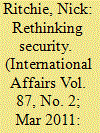

|
|
|
|
|
| Publication |
2011.
|
| Summary/Abstract |
In 2010 the coalition government conducted a major review of defence and security policy. This article explores the review process from a critical perspective by examining and challenging the state-centrism of prevailing conceptions of current policy reflected in the quest to define and perform a particular 'national role' in contrast to a human-centric framework focused on the UK citizen. It argues that shifting the focus of policy to the individual makes a qualitative difference to how we think about requirements for the UK's armed forces and challenges ingrained assumptions about defence and security in relation to military operations of choice and attendant expensive, expeditionary war-fighting capabilities. In particular, it confronts the prevailing narrative that UK national security-as-global risk management must be met by securing the state against pervasive multidimensional risk through military force, that military power projection capabilities are a vital source of international influence and national prestige and that the exercise of UK military power constitutes a 'force for good' for the long-term human security needs of citizens in both the intervened and intervening state.
|
|
|
|
|
|
|
|
|
|
|
|
|
|
|
|
| 10 |
ID:
128077
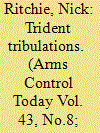

|
|
|
|
|
| Publication |
2013.
|
| Summary/Abstract |
The United Kingdom's nuclear weapons policy is in flux as the country debates whether to replace its current Trident strategic nuclear weapons system and remain in the nuclear weapons business for another generation. Choices about nuclear weapons are certain to feature in the next general election in May 2015. The debate is deeply political and parochial, but also involves a much broader set of issues related to nuclear deterrence and steps toward nuclear disarmament. Some of this debate came to a head with the publication of the government's "Trident Alternatives Review" in July.[1] This article examines the political issues surrounding the report and sets them in the broader context of deterrence and disarmament.
|
|
|
|
|
|
|
|
|
|
|
|
|
|
|
|
| 11 |
ID:
119253


|
|
|
|
|
| Publication |
2013.
|
| Summary/Abstract |
Nuclear weapons remain deeply embedded not only in strategic thinking and force postures, but also in our political cultures in ways that assign multiple, powerful socio-political values to the bomb. Progress towards nuclear zero will necessarily require peeling away the layers of value to the point where it becomes politically, strategically, and socially acceptable to permanently relinquish a nuclear capability. The concept and process of devaluing nuclear weapons is contested. It is a broad concept that covers notions of reducing the role, delegitimizing, reducing the salience, and marginalizing nuclear weapons in the declaratory and operational policies of the nuclear powers. This article argues that to understand what a process of devaluing might look like, we first need a deeper understanding of how nuclear weapons are valued. To achieve this, the article moves through four stages. First, it provides an overview of the lexicon of devaluing and subsidiary terms in global nuclear discourse since the end of the Cold War. Second, it discusses how we know nuclear value and its discursive construction. Third, using the United Kingdom as a case study it explores the 'regime of value' in which British nuclear weapons are embedded and the implications for devaluing. Finally, it reflects on William Walker's notion of 'responsible nuclear sovereignty' and the tensions at the nexus of deterrence/devaluing.
|
|
|
|
|
|
|
|
|
|
|
|
|
|
|
|
| 12 |
ID:
131441
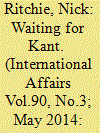

|
|
|
|
|
| Publication |
2014.
|
| Summary/Abstract |
Expectations of significant progress towards a nuclear weapons-free world continue to shape global nuclear politics. Progress towards nuclear disarmament will require diminishing the value of nuclear weapons to the point where it becomes politically, strategically and socially acceptable for nuclear-armed states to relinquish permanently their nuclear arsenals. Key to this are the concepts and processes of 'devaluing' and 'delegitimizing' nuclear weapons that have steadily coalesced in global nuclear discourse since the mid-1990s. This article builds on current research by developing three images of nuclear disarmament under the Nuclear Non-Proliferation Treaty (NPT): 'surface' devaluing, 'deep' devaluing, and delegitimizing nuclear weapons. The first represents codification by the nuclear-weapon states of the transformation of the Cold War environment through reductions in the size and role of nuclear arsenals that leaves the logic of nuclear deterrence and nuclear prestige largely unchanged. Deep devaluing is framed as a reconceptualization of the political, strategic and military logics that underpin nuclear-weapons policies and practices. Delegitimizing represents a more radical normative project to transform collective meanings assigned to nuclear weapons. The analysis examines conceptions of devaluing nuclear weapons from the perspective of non-nuclear weapon states and the relationship between devaluing nuclear weapons and the idea of a spectrum of nuclear deterrence. It concludes by highlighting the tension between surface and deep devaluing, the emergence of a delegitimizing agenda, and the political implications for the current NPT review cycle set to culminate in the next quinquennial Review Conference in 2015.
|
|
|
|
|
|
|
|
|
|
|
|
|
|
|
|
|
|
|
|
|